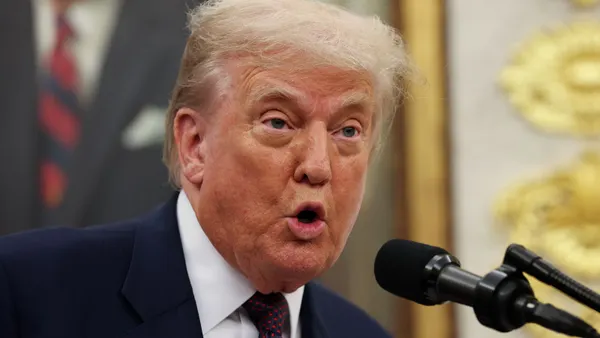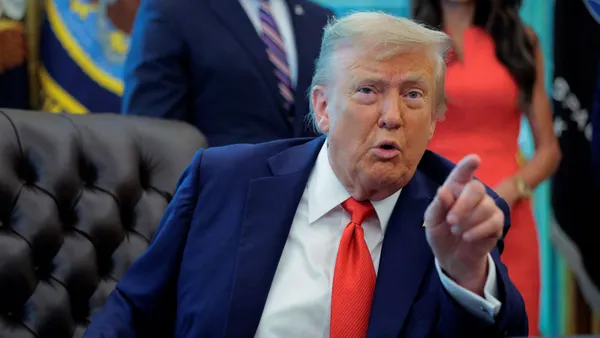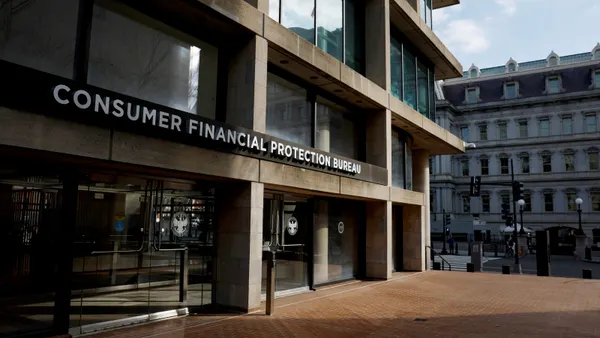Dive Brief:
-
The Justice Department (DOJ) filed a brief Tuesday asking the Supreme Court to take a case challenging the leadership structure of the Consumer Financial Protection Bureau (CFPB).
-
Separately, CFPB Director Kathy Kraninger wrote Senate Majority Leader Mitch McConnell, R-KY, and House Speaker Nancy Pelosi, D-CA, on Tuesday, indicating she backs the DOJ's position that President Donald Trump should be able to fire her at his discretion.
- The bureau has taken a less aggressive regulatory stance with Trump in office. It initiated 15 enforcement investigations in fiscal 2018, a sharp drop from 63 in fiscal 2017 and 70 in fiscal 2016, The Wall Street Journal reported.
Dive Insight:
The 2010 law that established the CFPB says the director can be removed only for "inefficiency, neglect of duty, or malfeasance in office," according to Bloomberg. But companies are using the bureau’s structure to challenge enforcement actions against them.
In Seila Law v. CFPB, a California law firm accused of making sales pitches to indebted consumers is trying to curb a CFPB investigation into its practices by arguing the bureau was set up in violation of the constitutional separation of powers.
The Justice Department brief was filed in connection to that case, which is pending before the 9th U.S. Circuit Court of Appeals. The administration's input boosts the likelihood that the Supreme Court will take up the case in its next term, which starts in October. A ruling could come by June 2020.
Kraninger wrote to lawmakers Tuesday that, even if the court finds the CFPB's structure unconstitutional, the agency should remain "fully operative," according to CNBC. "My determination that the for-cause removal provision is unconstitutional does not affect my commitment to fulfilling the Bureau's statutory responsibilities," she wrote.
Kraninger clarified her position in an email to bureau staff, American Banker reported.
"Litigation over [the CFPB's constitutionality] has caused significant delays to some of our enforcement and regulatory actions," she wrote. "I believe this dynamic will not change until the constitutional question is resolved either by Congress or the Supreme Court."
During her nomination process, Kraninger said "the ultimate question of the constitutionality of the Bureau's structure is one for Congress or the courts to resolve."
However, Solicitor General Noel Francisco wrote in his brief Tuesday that "the Director has reconsidered that position." The Justice Department said previously that it determined the CFPB to be unconstitutional, but not until now has it asked the top court to rule on the matter.
Courts thus far have upheld the CFPB's structure, but some Republicans have claimed for years that the "for-cause" provision gives the CFPB leader too much unchecked power.
The Trump administration has taken several steps to erode the agency's power. When the bureau's original director, Richard Cordray, resigned in 2017 to make an unsuccessful run for governor in Ohio, Trump nominated Mick Mulvaney, one of the agency's fiercest critics, to lead it. Months later, the administration stripped the bureau of its power to enforce anti-discrimination in lending.
Succession at the bureau sparked its own court battle when Leandra English, the CFPB's deputy director under Cordray sought a restraining order to prevent Mulvaney from taking the helm of the agency. English dropped the suit when she resigned from the CFPB in 2018.













